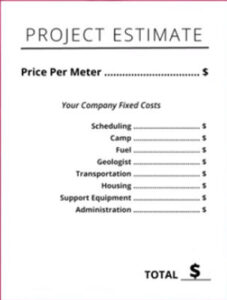Almost all states prohibit homeowners from building, repairing and sealing a well themselves and only use the services of licensed contractors in this regard. In this article, we will discuss everything you need to know about working with well contractors.
How to look for a Contractor?
After you decide to dig a well on your property, the next step is to hire a contractor. It is better to hire a contractor from your neighborhood as they are aware of digging trends in the area. You must consider the following while selecting a well contractor.
- Is the contractor approved by your state? Ask for a valid license or certification number and check it against your state’s published well contractor list. You can find information for all the states here.
- Is the contractor a member of the National Ground Water Association (NGWA)? NGWA is a prestigious organization working to educate the private well water users on water quality, well construction, and maintenance.
- What documents will the contractor give you after completing the work? Be specific about well log and well completion reports.
- Ask your contractor for a written project. It is better to jot down all the important points, so you don’t have to face any issues later.
- Make sure that the contractor has a qualified team and machinery.
- The contractor must be familiar with relevant health and sanitary standards.
- Ensure that all the materials and machinery that will be used are approved by your state.
- Check out the reviews.
- Take quotations from at least 3 contractors.
- You can reach NGWA at (800) 551-7379 to get more information regarding well construction and working with a contractor.
Costs

The next important thing to consider is costing. It is better to get an itemized cost than a lump sum estimate. A well drilling project may contain costs like:
- Drilling cost (per foot)
- Casing cost (per foot)
- Material cost such as grouting, well cap, well pump, well screen, water tank, or any other treatment unit installed with the system
- Labor costs
- Water testing and disinfection costs
- Abandonment costs (in case water is not found)
- Miscellaneous costs
Make sure you ask the contractor specifically to mention every cost. Anything undecided can lead to overcharging.
Written Contracts
Before commencing the work, you must ask for a written contract. A written contract acts as a guarantee. A well drilling contract may include the following.
- Insurance coverage held by the owner and the driller
- Guarantee that only certified materials and tools will be used in the drilling process
- Undertaking from the driller that all the work will be done according to the applicable rules and regulation and ensuring all the sanitary conditions
- Well specifications; depth, diameter, casing thickness, grouting area, well cap, well pump, and other details specific to a particular drilling site
- Water testing and disinfection procedure
- Post work cleanup
- A proposed start and end date
- Payment details (installments/full and payment mode)
Post Work Checklist
Before transferring the payments, you must do the following.
- Well Depth – Check out the depth of the recently constructed well. You can use a measuring tape to measure the well depth.
- Well Yield – Inquire the flow rate produced from the well, the pumping rate, and the water pump pressure setting. Then check the flow rate. If the contractor tells you a flow rate of 3 gallons per minute, take a 3-gallon bucket and note down the time needed to fill it. If it fills around 1 minute, you are good to go.
- Well Cap and Grouting – Make sure that the well cap, grouting, concrete pads around the wellhead are according to the state regulations and the written contract.
- Disinfection – Confirm that the well has been disinfected according to the required standards, and the water tests have been performed before and after disinfection.
- Well Completion Report – A well completion report is submitted to the relevant authorities for approval. It usually takes 20-30 days for approval and inspection. It is the contractor’s responsibility to provide you with an approved copy of the well-completion report.
FAQ
What is per foot drilling cost for a water well?
Well drilling costs vary from one area to another and the type of well drilled. Generally, it is $15 to $25 per foot for drilling, $25 to $70 per foot for complete installation. For irrigational wells, it can be $50 to $100 and for geothermal wells, expect to pay $5 to $40 per foot.
What will I get from contractors after they complete my work?
Before leaving your premises, a well contractor will tell you about the well depth, well yield, make you check the well cap, give you a disinfection report and submit a well completion report afterward. Make sure you check all the things mentioned in the written contract.
Shall I ask for itemized costs or lump sum costs for well drilling?
It is better to ask for itemized costs from the contractor. In this way, you can have an estimate of how much you are spending on each thing. Itemized bill will also contain details of every material and equipment being used for your well. Hence, you can make sure that all the things used in the well are of high quality and approved by the local authorities.
Final Words
You must be very careful while selecting a drilling place and a well driller. Go for the contractors with the best reputation in the area. Make sure you check reviews. You may have to pay a bit more for the best contractor, but it will be worth it in the long run. A better quality well goes a long way.
